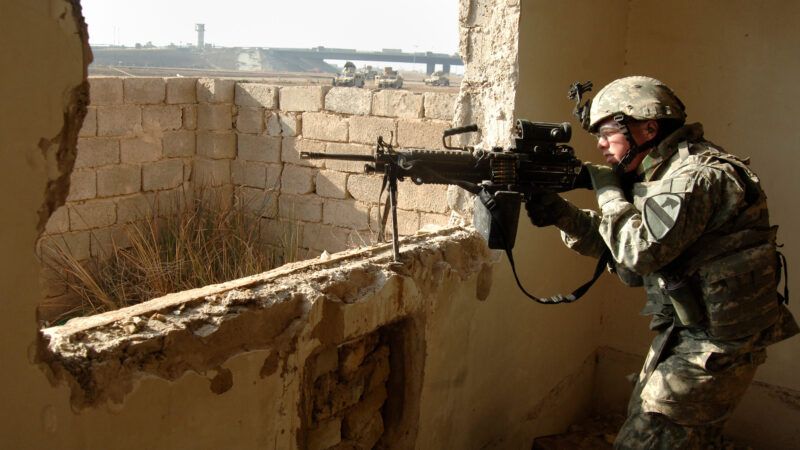Repealing the 2002 AUMF Won't Be Enough To End Forever Wars
Repealing the law that allowed America to depose Saddam Hussein won't stop us from waging war elsewhere.

The House is expected to vote tomorrow on a bill introduced by Rep. Barbara Lee (D–Calif.) that would repeal the 2002 Authorization for the Use of Military Force (AUMF). Passed as the United States geared up for war against Saddam Hussein's regime, the 2002 AUMF authorizes the president to "defend the national security of the United States against the continuing threat posed by Iraq," using the U.S. Armed Forces "as he determines to be necessary."
Authorizations like the 2002 AUMF empower the president to take military action without the approval of Congress, which is the sole body allowed to declare war according to the Constitution. Congress hasn't formally declared war since World War II, but over the years it has passed laws that have given the president increasing amounts of discretion in military conduct (with decreasing amounts of oversight).
President Joe Biden voted in favor of the 2002 AUMF as a senator—but he's now endorsing its repeal. "The administration supports the repeal of the 2002 AUMF, as the United States has no ongoing military activities that rely solely on the 2002 AUMF as a domestic legal basis," read a Monday statement. "Repeal of the 2002 AUMF would likely have minimal impact on current military operations."
As important as it is to rein in the president's military powers, the Biden administration's statement shows that repealing the 2002 AUMF would be a largely symbolic gesture. If Biden hopes to make good on his promise to end "forever wars," he will need to look beyond just the 2002 AUMF.
The 2001 AUMF, passed one week after September 11, is a far more important framework to repeal. That measure authorizes the president "to use all necessary and appropriate force" against "nations, organizations, or persons" he determines were involved in the terrorist attacks. Presidents have capitalized on that obvious latitude, justifying 41 operations in 19 countries thanks to generous interpretations of the 2001 AUMF's phrasing.
The 2002 AUMF, meanwhile, has mostly been used to bolster the 2001 AUMF in conducting military engagements. Since the Iraq War ended in 2011, it has not been the sole authorization behind any military operations. In 2014, the Obama administration named it as an "alternative statutory basis" for the U.S. campaign against the Islamic State in Iraq. The Trump administration also invoked it to justify its conflict with the Islamic State, but asserted authorization to address threats in "Syria or elsewhere" as well.
Even if lawmakers vote to repeal the 2002 AUMF, there remains the question of what might take its place. The Biden administration stipulated its support of repealing the 2002 AUMF with a call to replace it "with a narrow and specific framework appropriate to ensure that we can continue to protect Americans from terrorist threats." Biden proved very early into his term that he isn't opposed to continuing U.S. military operations in the Middle East. That, combined with his wish to forge a new authorization framework—perhaps with more teeth than the 2002 AUMF—should worry opponents of U.S. military entanglement abroad.
Senate Majority Leader Chuck Schumer (D–N.Y.), in announcing his support for the repeal effort, said that the Senate would consider the bill sometime "this year." Next week, the Senate Foreign Relations Committee will mark up a bill introduced by Sens. Tim Kaine (D–Va.) and Todd Young (R–Ind.) earlier this year that would repeal both the 2002 AUMF and the 1991 AUMF, which was passed to authorize military force during the Gulf War.
As Reason's Scott Shackford pointed out in March, it seems that Biden "still wants to be able to act on what the administration sees as threats without having to get the approval of Congress." Repealing the 2002 AUMF may be a welcome gesture after decades of executive overreach in waging war—but the devil is in the details.


Show Comments (22)